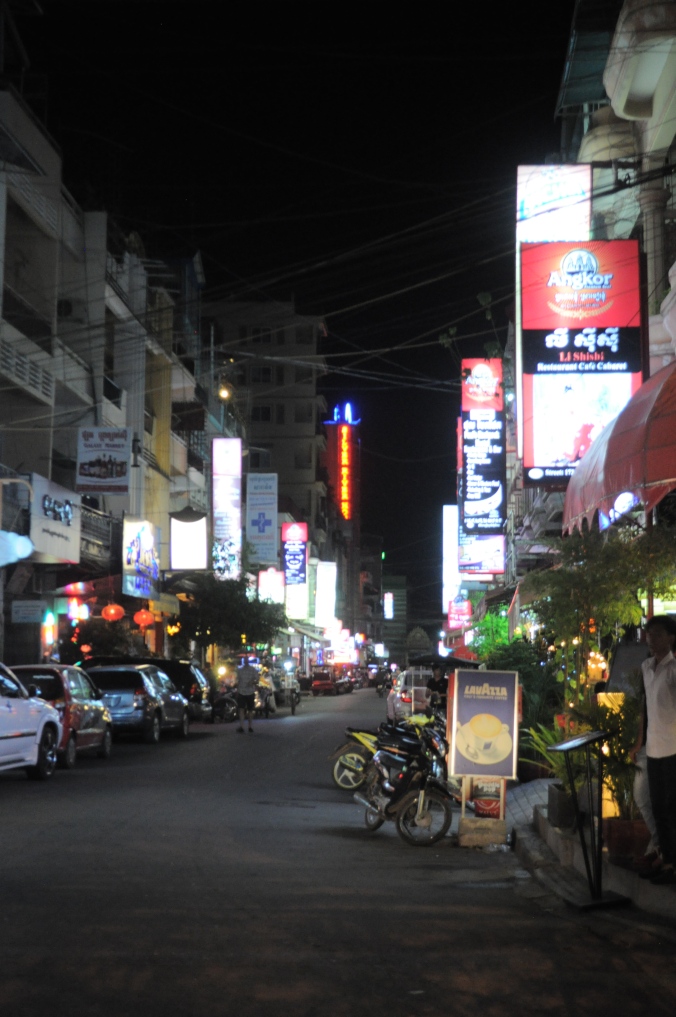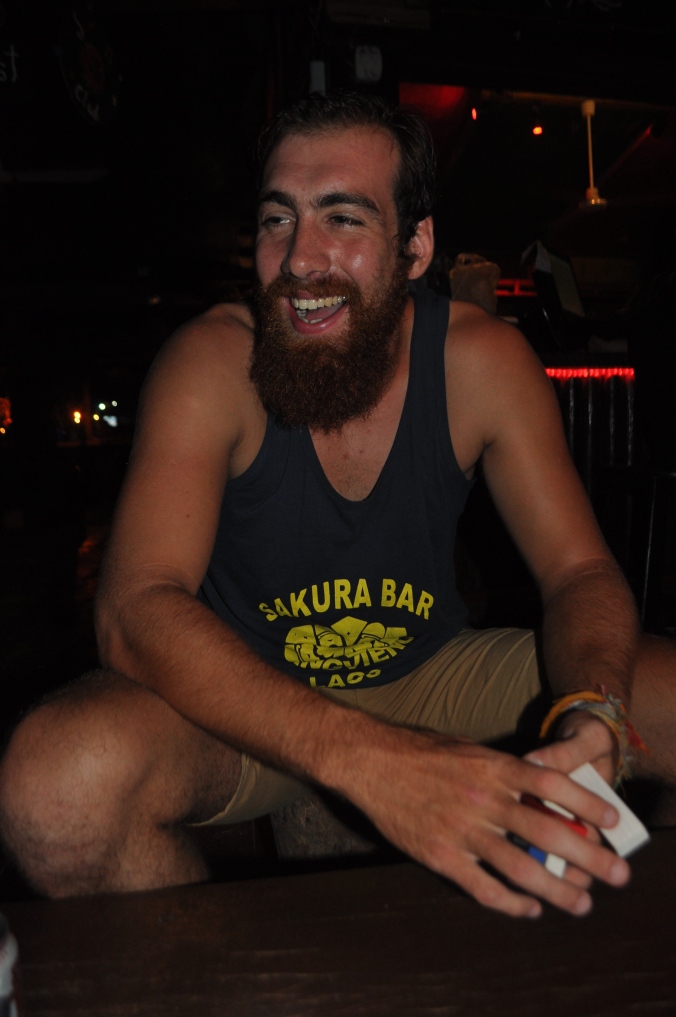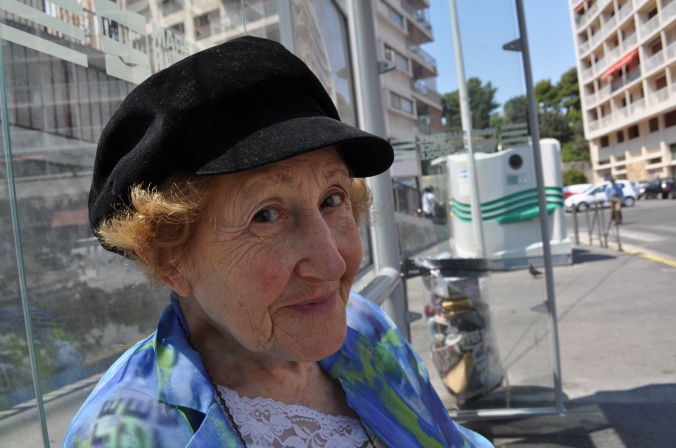For context, this conversation started in July, just before I left Silvia in Cambodia. We continued it when I saw her again in September, during a trip to Hamburg. We are now in October, I’m writing from my home in France.
It’s our last night after ten days of traveling together, an eternity in backpacker time. We’ve had a great time. We have the same travel philosophy: walk, talk, eat, see, repeat. We’ve talked a lot. Between us, the words flow, and we laugh. She makes me think and I love it. When we argue, it’s in an enthusiastic way, because it’s food for thought. We barely ever argue, anyway. We haven’t had any real disagreement. Yet.
“I just don’t understand why a religious group needs to have a country.” I don’t remember how we got to talk about it. Silvia is German, but for a long time, she preferred to say that she’s from the world. She doesn’t believe in the groups that separate people into “us” and “them”. And I get that. But…
“That’s the thing, though. Being Jewish is not just about religion. It’s a people as well.”
And then we talk. Mostly, I talk. I move my hands a lot, and I get frustrated. I tear up a bit. I had no idea it mattered to me that much. Somehow, it feels important, it feels like I have to make her understand, tonight. I have to be heard. On what?
I’m Jewish, but I’m not “very Jewish”. I don’t practice Judaism as a religion, not really. I don’t eat kosher (I wasn’t a vegetarian at the time), I don’t pray with these words, I don’t like the idea that there is a chosen people, and, you know, I’ve heard religion being used against queer people, women and open love so many times that it makes me flinch a bit. I used to be a lot angrier about it. I used to dismiss it all as an archaic and patriarchal tool of oppression. Now I have tenderness and affection towards it. I am there at the family holidays, I sing along, I clap my hands, I love listening to my dad when he explains, I want to know more; the philosophy and symbolism truly move me.
Still, why does it matter so much? I wonder; as I try to explain to her, I explain it to myself. I am Jewish. My religious beliefs don’t enter that statement. I am Jewish in my blood, it’s part of who I am, it’s the environment in which I was raised. Even if I lost every bit of faith and if I stopped every little practice, I’d still be Jewish. Because Judaism is more than a religion. I said it already, and I’ll say it again: it’s a people. To many readers, this will be completely obvious, but to me, the laic girl with olive skin and a self-important nose, it wasn’t always. And clearly, it wasn’t for my friend either.
She points out that I don’t have to be Jewish, I have a choice. You can be born in a catholic family and not be catholic.
– You clearly don’t get my point. Would you say that if I was Armenian? I know it’s hard to understand, but it’s the same. I am Jewish like I would be Armenian. You can say that I choose who I am, but I don’t, not completely, the same way you don’t choose to be German. I’m sorry to jump to the Godwin Point, but I’m also Jewish because I can give up religion all I want, if someone wants to murder Jews, they’ll find me, and they won’t give a shit what my identity of choice is. I am Jewish sometimes more than I am French. Because no matter how French I am, I will always be asked “where are you really from?”. People say that, sometimes, when I answer “France” to their “where are you from?”, because it doesn’t explain my face, and it doesn’t explain my name. And if I say I’m Jewish, I hear “that’s not your nationality”. But the fact is I have nothing else. I have no other answer. I’m French, that explains my accent, and why I’m such a food snob. I’m Jewish, that explains pretty much everything else you see. I will always be a foreigner, everywhere that is not Israel, that’s what judaism is, and that’s why we need a country. Everybody needs a sense of belonging. It doesn’t mean I want to move to Israel. I quite enjoy being part of a minority, actually – but it’s important that there is a place where I’m not.”
She looks ahead, she doesn’t answer much. I know her. I know that the same way I’m hurt to see my friend as one of “those people” who don’t accept “us”, she’s sad to see me as one of “them”, the guys who build boxes to neatly separate humans, instead of embracing the unity in everybody’s uniqueness. We drop the topic because it’s painful and it seems fruitless. “I feel like you’re not hearing me, and it hurts my feelings. Let’s talk about something else.” She says she’s trying to understand, she is, but it’s not easy, it’s very new for her. And I believe her. We laugh a lot that night, and we say goodbye with love.
We keep in touch while I’m in India and when I go back home. So when I plan a trip to Berlin in September, I ask her if and where we can meet up. “Let’s see each other in Hamburg!” That’s not where she lives, it’s a halfway point. I love it. It’s grey when my bus drops me at the station, I’m wearing a lot more clothes. Still, when I see her, we run into each other’s arms, and we start where we left off: walking and talking, and stopping for warm drinks. We do that until it’s night. When we’re lost, she tells me she’d been thinking about the Phnom Penh conversation. It had started something for her. And she thinks she got it.
It feels like finding a lost part of my heart. I listen.
She’d thought about her own identity, and how being German matters to her. She’d talked it through with various people. And she’d realized that the first step to the situation getting better in the Middle-East, before anything else, is that the other countries recognize Israel. That it’s not Israel or Palestine, it has to be both.
– YES!
We keep talking about small and big things as we walk in the night. Somehow as I write this I think of the book Reunion by Fred Uhlman, in which a Jewish guy realizes after the war that his German friend who rejected him when they were kids died protecting Jews from the nazis. Our separation wasn’t nearly as dramatic, but still, I felt reunited with my friend.
Back home, when I tell my dad about all this – it made me so happy I had to share the story -, he says “Go figure that a Jewish Moroccan French would explain judaism to a German in Cambodia”.
--%D7%A9%D7%A7%D7%95%D7%A3.gif)
EN FRANÇAIS
Pour le contexte, cette conversation a commencé en juillet, juste avant que je quitte Silvia, au Cambodge. Elle a continué en septembre, quand je l’ai revue à Hambourg. Nous sommes maintenant en octobre, j’écris depuis chez moi, en France.
C’est notre dernière nuit ensemble, après 10 jours de vadrouille, une éternité en temps de backpacker. On s’est éclatées. On a la même vision du voyage : marcher, parler, manger, voir, recommencer. On a beaucoup parlé. Entre nous, les mots coulent, et on se marre. Elle me fait réfléchir, j’adore ça. Quand on n’est pas du même avis, c’est avec enthousiasme, parce que c’est bon pour les méninges. On n’a pas eu de vrai désaccord. Pas encore.
“Je ne comprends pas pourquoi un groupe religieux devrait avoir son propre pays.” Je ne me rappelle pas comment on en est arrivées là. Silvia est allemande, mais pendant longtemps elle a préféré dire qu’elle était citoyenne du monde. Elle ne croit pas en les groupes qui séparent entre “nous” et “eux”. Et je comprends. Mais…
“C’est ça le truc, en fait. Être juif ce n’est pas seulement une question de religion. C’est aussi un peuple.”
Alors on parle. Surtout, je parle. Je bouge les mains dans tous les sens, je me frustre. J’ai même les larmes qui montent. Je n’avais pas idée que j’y tenais tant que ça. Il semble soudain que c’est de la plus grande importance, qu’il faut que je lui fasse comprendre. Qu’il faut que je sois entendue. Sur quoi ?
Je suis juive, mais pas “très juive”. Je ne pratique pas le judaïsme comme religion, pas vraiment. Je ne mange pas casher (je n’étais pas encore végétarienne), je ne prie pas avec ces mots-là, je n’aime pas qu’il y ait un peuple élu, et j’ai vu la religion être employée contre les queers, les femmes et l’amour libre tellement de fois que ça me titille, juste un peu. Avant, c’était pire, j’étais vraiment énervée. Je rejetais la religion entièrement, avec les autres outils d’oppression archaïques et patriarcaux. Maintenant, j’ai de la tendresse et de l’affection pour elle. Je vais aux réunions de famille, je chante, je tape des mains, j’adore écouter mon père expliquer, je veux en savoir plus. La philosophie et les symboles juifs m’émeuvent.
Mais tout de même, pourquoi c’est si important ? Je me demande; et pendant que je lui explique à elle, je me l’explique à moi-même. Je suis juive. Mes croyances religieuses n’entrent pas dans cette affirmation. Je suis juive dans mon sang, ça fait partie de qui je suis, c’est le cadre dans lequel j’ai été élevée. Même si je me détachais de toute foi et de toute pratique, je serais toujours juive. Parce que le judaïsme c’est plus qu’une religion. Je l’ai dit et je le dis encore : c’est un peuple. Pour ceux qui lisent, ça paraîtra peut-être complètement évident, mais pour moi, la fille laïque avec la peau olive et le nez qui se sent important, ça ne l’a pas toujours été. Et de toute évidence, ça ne l’est pas pour mon amie.
Elle remarque que je ne suis pas obligée d’être juive. Tu choisis ta religion. Tu peux naître dans une famille catholique et ne pas être catholique.
– Tu ne saisis pas. Est-ce que tu dirais ça si j’étais arménienne ? Je sais que c’est dur à comprendre, mais c’est la même chose. Je suis juive comme je serais arménienne. Tu peux dire que je choisis qui je suis, mais ce n’est pas vrai, pas tout à fait, comme tu n’as pas choisi d’être allemande. Désolée d’atteindre le Point Godwin si vite, mais je suis juive aussi parce que si un nouveau débile décide d’assassiner du juif, il saura me trouver et il n’en aura rien à foutre de mon identité préférentielle. Je suis juive parfois plus que je suis française. Parce qu’on me demandera toujours “mais pour de vrai, tu viens d’où ?”. On me dit ça, parfois, quand à “Tu viens d’où ?” je dis “France”, parce que ça n’explique ni ma tête ni mon nom. Et si je dis “je suis juive”, j’entends “c’est pas une nationalité, ça”. Mais le fait est que je n’ai rien d’autre, aucune autre réponse. Je suis française, ça explique mon accent en anglais et pourquoi je suis une snob de la bouffe; je suis juive, ça explique à peu près tout ce que tu vois d’autre. Je serai toujours une métèque, partout ailleurs qu’en Israël. C’est ça être juif. Et c’est pour ça qu’il nous faut un pays. Tout le monde a besoin d’un sentiment d’appartenance. Ça ne veut pas dire que je veux emménager en Israël. Ça me plaît bien, en fait, d’être d’une minorité – mais ça reste important qu’au moins à un endroit, je ne le sois pas.”
Elle regarde droit devant, elle ne répond pas vraiment. Je la connais, je sais qu’autant je suis blessée de voir que mon amie fait partie de “ceux-là”, ceux qui ne “nous” acceptent pas, autant ça l’attriste de me voir comme l’un d’entre “eux”, ceux qui construisent des boîtes pour ranger les humains bien proprement, sans que ça se mélange. On laisse tomber le sujet parce qu’il fait mal et qu’il semble sans fruit. “J’ai l’impression que tu ne m’entends pas, et ça me blesse. Parlons d’autre chose.” Elle dit qu’elle essaye de comprendre, vraiment, mais que ce n’est pas facile, c’est très nouveau pour elle, ces idées. Et je la crois. On rit beaucoup cette nuit-là, et au matin on dit au revoir avec amour.
On reste en contact pendant mon séjour en Inde, et quand je rentre à la maison. Du coup, quand j’organise un voyage à Berlin en septembre, je lui demande si et où on pourrait se voir. “Retrouvons-nous à Hambourg” Elle n’y habite pas : c’est un point de mi chemin. Ça me fait plaisir. Il fait gris quand mon bus me dépose à la station, je porte bien plus de vêtements. Mais quand je la vois, on se coure dans les bras l’une de l’autre, et on reprend comme si c’était hier : on marche, on parle, on s’arrête pour des boissons chaudes. Jusqu’à la nuit. Quand on est bien perdues, elle me dit qu’elle a pensé à notre conversation de Phnom Penh. Que ça avait initié quelque chose en elle. Et qu’elle pense avoir compris.
C’est comme retrouver une partie de mon coeur oubliée. J’écoute.
Elle a pensé à sa propre identité, à comment être allemande l’affecte. Elle en a parlé autour d’elle. Elle s’est rendu compte que la première étape pour une amélioration de la situation au Moyen-Orient, avant toute chose, c’est que les autres pays reconnaissent Israël. Que ce n’est pas Israël ou la Palestine, que ça doit être les deux.
– OUI !
On parle de grandes et de petites choses en marchant dans la nuit. En écrivant ces mots, je pense à L’ami retrouvé de Fred Uhlman, où un Juif se apprend après la guerre que son ami allemand qui l’avait rejeté dans son enfance s’est fait tuer par les nazis pour avoir protégé des Juifs. Notre séparation était loin d’être aussi dramatique, mais quand même, je me suis sentie réunie avec mon amie.
Quand j’en parle avec mon père à mon retour – ça m’avait tant réjouit qu’il fallait que je dise –, il sort « Va imaginer qu’une juive française marocaine expliquerait le judaïsme à une Allemande au Cambodge. »







--%D7%A9%D7%A7%D7%95%D7%A3.gif)




























































